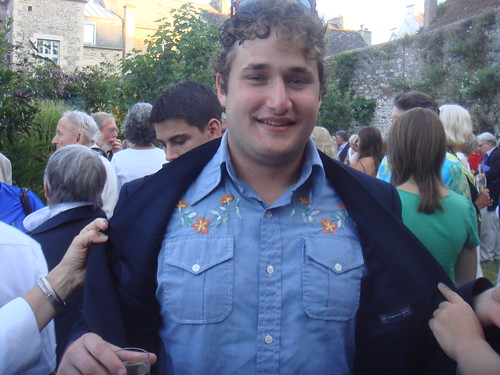 I read an interview this morning by former Massachusetts Representative Joe Kennedy, who runs the nonprofit Citizens Energy Corp., which provides discount heating oil to Americans in need in 15 states and the District of Columbia.
I read an interview this morning by former Massachusetts Representative Joe Kennedy, who runs the nonprofit Citizens Energy Corp., which provides discount heating oil to Americans in need in 15 states and the District of Columbia.
On quote of his that stuck out for me was this:
The U.S. oil industry in the last five hears has made over $800 billion in profits. None of them is putting profits back into developing new sources of crude. ExxonMobile put zero percent of profits into renewable or alternative energy; BP, six tenths of 1%; ConocoPhillips, seven tenths of 1%; Shell, 1.3%; Chevron, 0.5%. And everybody says we’re running out of oil. You know, 74% of the earth’s surface – as we all learned in the third grade – is covered with water. And we have developed less than 1% of the energy supplies contained underneath the surface of the ocean. So there’s nothing to suggest to me that right now there’s an imminent crisis
It’s amazing how little these companies are putting towards alternative fuels. It makes me think all those BP commercials I see on the Discovery Channel are totally hypocritical.
 v
v Day 1: There are some betting days when you know you’ve got your hands reined around the right horse, and when that bus pulled up I knew it was one of those days. They asked me my double down on who was gonna wail first, and I went with the pale faced white boy twirling a stick.
Day 1: There are some betting days when you know you’ve got your hands reined around the right horse, and when that bus pulled up I knew it was one of those days. They asked me my double down on who was gonna wail first, and I went with the pale faced white boy twirling a stick. …And let’s talk a little about the “one foreign film begets another” assumption. Just because I randomly order up “The Milkmaid of Avignon” during a bored frantic queuing session doesn’t mean I’m interested in watching just any foreign film. So spare me the instructions to rent some epic tale of a young boy waddling through the Uzbekistani mountains chasing a tire iron. Nor does it mean I will perk my ears up at any movie with a corseted woman on the cover who’s cleavage is about to take over Luxembourg. For your information “The Milkmaid of Avignon” is a gripping period tale of a young woman of humble origins who through courage, determination and unwavering firmness survived famine, the Spanish Inquisition and seeing John Paul Belmondo’s orgasm face. …
…And let’s talk a little about the “one foreign film begets another” assumption. Just because I randomly order up “The Milkmaid of Avignon” during a bored frantic queuing session doesn’t mean I’m interested in watching just any foreign film. So spare me the instructions to rent some epic tale of a young boy waddling through the Uzbekistani mountains chasing a tire iron. Nor does it mean I will perk my ears up at any movie with a corseted woman on the cover who’s cleavage is about to take over Luxembourg. For your information “The Milkmaid of Avignon” is a gripping period tale of a young woman of humble origins who through courage, determination and unwavering firmness survived famine, the Spanish Inquisition and seeing John Paul Belmondo’s orgasm face. … The inspiring tale of a young boy who examines the ups and downs of all his past relationships through the viewpoint of his mother, a tap dancing penguin who one night fell victim to the passions of a drunk and lonely Spanish researcher on post in Antartica. This journey of self examination takes him hitchhiking where he meets Esteban, a traveling defibrillator salesman/fluorophiliac (people who like to rub toothpaste on their genitals before sex) on his way to meditate in the confines of a buddhist leper colony. This transformation inevitably takes him back to his roots, where he himself becomes a tap dancing penguin and strangely adopts the voice of Hugh Jackman, who as the voice of a computerized swimming bird uses slightly more facial expressions than he did in “Swordfish”.(Side comment: There’s alot of talk these days about movies being safe for the fragile minds of young children, but I ask you this: which would frighten you more as a young child, computerized tap dancing penguins or Michael Douglas doing a woman from behind over a desk. I say the penguin, unless the name of that actress has the words Glenn and Close in it).
The inspiring tale of a young boy who examines the ups and downs of all his past relationships through the viewpoint of his mother, a tap dancing penguin who one night fell victim to the passions of a drunk and lonely Spanish researcher on post in Antartica. This journey of self examination takes him hitchhiking where he meets Esteban, a traveling defibrillator salesman/fluorophiliac (people who like to rub toothpaste on their genitals before sex) on his way to meditate in the confines of a buddhist leper colony. This transformation inevitably takes him back to his roots, where he himself becomes a tap dancing penguin and strangely adopts the voice of Hugh Jackman, who as the voice of a computerized swimming bird uses slightly more facial expressions than he did in “Swordfish”.(Side comment: There’s alot of talk these days about movies being safe for the fragile minds of young children, but I ask you this: which would frighten you more as a young child, computerized tap dancing penguins or Michael Douglas doing a woman from behind over a desk. I say the penguin, unless the name of that actress has the words Glenn and Close in it).



